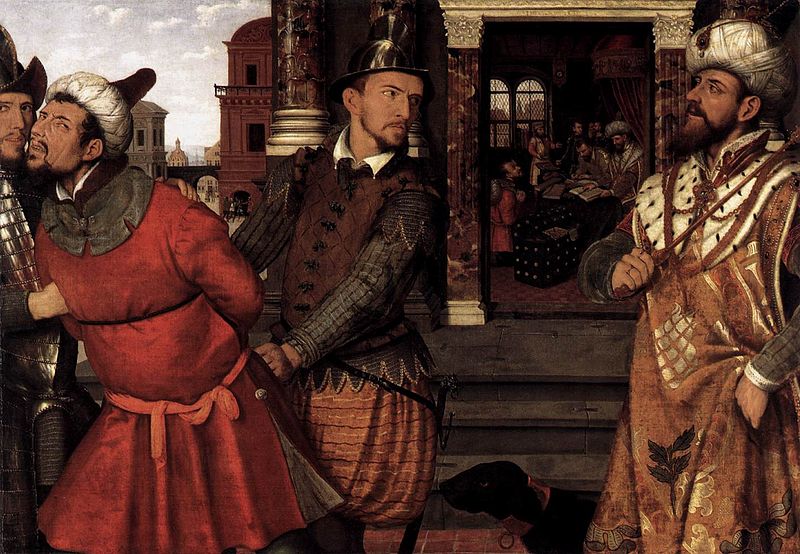
For a printable copy of this chapter (2) click here: 8.5×11″; A4 paper
Click here for a pdf of Genesis 4–11 in Redemptive History: 8.5×11″; A4 paper
.
.
d) Matt 18:31–34: Christ continued the parable in Matt 18:22–35, saying, “After his fellow slaves saw what occurred, they were highly distressed (lupeō). And they came and reported to their lord all that happened.”
Matthew employed the same word to express what the disciples felt upon learning that Jesus would die (Matt 17:22–23).[1]
Although the slaves had no money to rescue their colleague, they acted.[2] They went to the king.
Jesus did not speak of their motivation.[3] Yet, we can assume that they knew the king had cancelled the debt of the first slave.[4] After all, who wouldn’t have shouted that news to all who could hear?
.
.
Christ said, “Then he summoned him, [and] his lord said to him, ‘You evil slave, all that debt I forgave you because you entreated me. Was it not necessary for you to also show mercy to your fellow slave as I to you showed mercy?’”
As a result of this incident, the king easily discerned his slave’s true nature: wickedness.[5]
This speech forms the heart of the parable.[6] Just as the lord extended mercy rather than insisting on his right to be repaid, he expected the same of the one who received his forgiveness.[7]
The impact of the king’s unexpected act should have caused the slave to respond by showering others with that same mercy.[8]
God’s forgiveness toward us overflows into forgiving those who sin against us. As a result, the Lord blesses us, delivering more mercy (Matt 6:12, 14–15; Matt 5:7).[9]
In fact, granting mercy characterizes the people of God (Luke 6:35–36; 1 John 4:11–12).[10]
Compared to the immeasurable mercy the Lord extends to us, how can we refuse to forgive those whose transgressions pale in significance?[11] As we treat others, so shall God treat us (James 2:13).[12]
.
.
Jesus concluded the parable, proclaiming, “And, full of wrath, his lord handed him over to the torturers until he should repay all that was owed.”
Due to the first slave’s unwillingness to forgive another debtor, the king revoked the cancellation of his financial obligation.[13]
This had nothing to do with his ability to pay. Instead, he proved himself unworthy of the king’s mercy. God will not forgive those who prove unwilling to extend pardon.[14]
A lack of love for others indicates a failure to experience the repentance which results in eternal life.[15]
.
.
This scenario would have been familiar to the original audience.
An ancient papyrus from Greco-Roman Egypt indicates that the governor of Egypt incarcerated a man because he had “of his own authority imprisoned a worthy man [his alleged debtor] and also women.”[16]
As a result of his sin, the first slave received treatment far worse than sale to another master.[17]
People expected jailers who ran debtor’s prisons to inflict torture upon the detainees.[18] The slave’s destiny consisted of excruciating punishment, not mere detention.[19]
Only with full repayment—an impossibility—could he be freed.[20] Since he fell from political favor, no allies would dare come to his aid. He would never be released.[21]
Herod (73–4 BC) practiced torture,[22] although Jewish law prohibited it (Exod 21:26–27).[23]
.
.
Gentile kings had no such impediments.
A Roman inscription cites the job description of a public official who tortured and executed slaves at the demand of their owners. The services of such men allowed slave masters to avoid purchasing devices to inflict extreme pain and carrying out the deed themselves.[24]
Plautus (254–184 BC) wrote a play in which a master ordered the following punishment for the slave who had harmed his financial status:
“Take him where he may receive weighty and thick fetters, thence, after that, you shall go to the quarries for cutting stone. There, while the others are digging out eight stones, unless you daily do half as much work again, you shall have the name of the six-hundred-stripe man.”
[The torturer said], “He shall be taken all care of. For at night, fastened with chains, he shall be watched; in the daytime, beneath the ground, he shall be getting out stone. For many a day will I torture him; I’ll not respite him for a single day.”[25]
Since people in the Greco-Roman world knew the horrors of debt slavery and torture, this parable would have captured Peter’s attention, as well that of as Matthew’s original readers.[26]
With a Gentile king, the evil slave could not expect to be freed after seven years (Exod 21:2; Lev 25:39–41).[27]
Thus, Jesus alluded to a destiny of harsh judgment in the afterlife (Matt 10:28; Matt 13:41–42).[28]
Image via Wikimedia Commons
.
Read Matt 18:31–34. What about this situation highly distressed the imprisoned slave’s colleagues? Why did the king hand the first slave over to torturers? How do we know that he would never be released? What impact does this parable have as you consider your own willingness to forgive others?
.
.
.
.
Go to The Tragedy of Mercilessness (Matt 18:35)
[Related posts include A Lesson on Forgiveness (Matt 18:21–22); A King Settling Accounts (Matt 18:23–27); Astounding Hypocrisy (Matt 18:28–30); The Tragedy of Mercilessness (Matt 18:35); Lamech’s Ode to Himself (Gen 4:23–24); and Ancient Literature]
[Click here to go to Chapter 2: The Descent of Humanity (Genesis 4:17–24)]
.
[1]Hagner, Matthew 14–28, 539.
[2]Keener, The Gospel of Matthew: A Socio-Rhetorical Commentary, 460.
[3]France, The Gospel of Matthew, 707.
[4]Hagner, Matthew 14–28, 539.
[5]Wilkins, Matthew, 624.
[6]Hagner, Matthew 14–28, 540.
[7]France, The Gospel of Matthew, 707.
[8]Wilkins, Matthew, 624.
[9]Hagner, Matthew 14–28, 540.
[10]France, The Gospel of Matthew, 707.
[11]France, The Gospel of Matthew, 703.
[12]Hagner, Matthew 14–28, 540.
[13]Hagner, Matthew 14–28, 540.
[14]France, The Gospel of Matthew, 708.
[15]Gustav Stählin, “oργίζω” (orgizō), TDNT 5:382–447, 442.
[16]Deissman, Light from the Ancient East: The New Testament Illustrated by Recently Discovered Texts of the Graeco-Roman World, 267, https://archive.org/stream/lightfromancient00deis#page/n385/mode/2up.
[17]France, The Gospel of Matthew, 708.
[18]Wilkins, Matthew, 624.
[19]France, The Gospel of Matthew, 708.
[20]Hagner, Matthew 14–28, 540.
[21]Keener, IVPBBCNT, Matt 18:34.
[22]Josephus, The Wars of the Jews, 1.485, http://www.perseus.tufts.edu/hopper/text?doc=Perseus:text:1999.01.0148:book=1:section=485.
[23]Keener, IVPBBCNT, Matt 18:34.
[24]Jennifer A. Glancy, “Slaves and Slavery in the Matthean Parables,” JBL 119, no. 1 (1 January 2000): 67–90, 67, https://www.jstor.org/stable/pdf/3267969.pdf.
[25]T. Maccius Plautus, “The Captives,” in The Comedies of Plautus (trans. Henry Thomas Riley; London: G. Bell & Sons, 1912), 3.5, http://www.perseus.tufts.edu/hopper/text?doc=Perseus:text:1999.02.0096:act=3:scene=5.
[26]Keener, IVPBBCNT, Matt 18:35.
[27]Keener, The Gospel of Matthew: A Socio-Rhetorical Commentary, 459.
[28]Wilkins, Matthew, 624.
